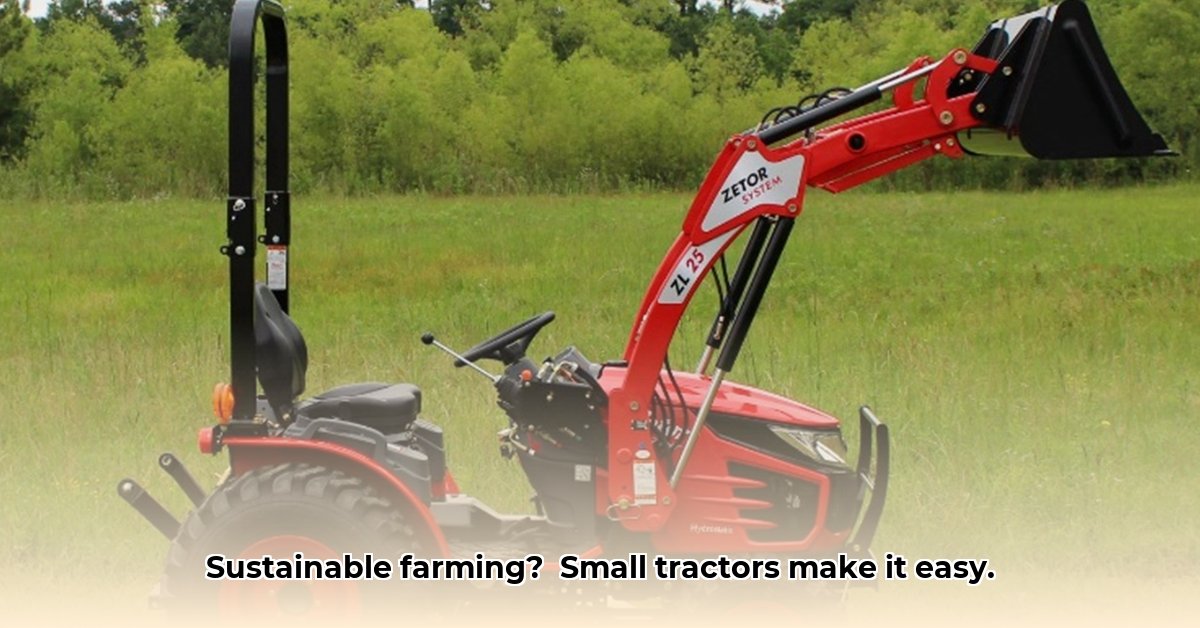
Thinking about boosting your farm's efficiency while minimizing your environmental footprint? Small tractor packages offer a powerful solution, but navigating the options can be challenging. This guide simplifies the process, helping you choose the perfect tractor to meet your needs and your commitment to sustainable agriculture. We'll cover everything from comparing tractor types and their environmental impact to selecting a reliable vendor and planning for the future. Whether you're a seasoned farmer or just starting out, this advice will guide you towards a smart investment that benefits both your farm and the planet. For more information on compatible implements, check out this helpful resource on tractor implements.
Small Tractor Packages: Optimizing Your Sustainable Farm
Small tractor packages are becoming increasingly vital for efficient and eco-conscious farming. But with diverse options available, selecting the right package requires careful consideration. This section breaks down the key factors to consider when making your selection.
Comparing Small Tractor Packages: Tillage vs. Precision Planting
The small tractor market generally categorizes packages into two primary types: those geared towards tillage and those focused on precision seeding. Tillage packages typically feature powerful engines and implements like plows and disks, ideal for extensive soil preparation on larger fields. Precision seeding packages prioritize accuracy, often incorporating GPS guidance and specialized seed drills for pinpoint planting, best suited for smaller farms or those aiming for optimal seed placement.
| Feature | Tillage-Focused Package | Precision Seeding Package |
|---|---|---|
| Typical Engine Power | Generally higher (e.g., 30-50 horsepower) | Usually moderate (e.g., 20-35 horsepower) |
| Main Implements | Plows, disks, cultivators, harrows | Precision seed drills, GPS guidance, fertilizer spreaders |
| Best Use | Extensive soil preparation, large fields | Accurate seeding, smaller to medium-sized farms |
| Likely Sustainability | May have a larger environmental impact due to soil disturbance | Potentially more environmentally friendly due to less tillage |
| Best for Farm Size | Larger acreage | Smaller to medium acreage |
Important Note: The data in this table represents general trends. Specific horsepower, features, and capabilities vary significantly between manufacturers and models. Detailed specifications should be obtained directly from manufacturers.
Sustainability: A Core Consideration in Tractor Selection
Sustainable farming practices are crucial for long-term agricultural viability and environmental responsibility. The right small tractor package can substantially contribute to these goals. Fuel efficiency is paramount—modern engines boast significant improvements over older models, leading to lower operating costs and a reduced carbon footprint. Beyond the tractor itself, implement selection plays a crucial role. No-till or reduced-till farming methods, enabled by appropriate attachments, minimize soil erosion, preserve soil health, and decrease fuel consumption.
However, comprehensive data comparing the overall environmental impact of different tractor packages are currently limited. Further research and transparency from manufacturers are essential to provide farmers with the complete information needed for informed decisions.
Choosing Your Perfect Small Tractor: An Actionable Guide
Selecting the ideal small tractor involves a systematic approach. This step-by-step guide will help you navigate the process effectively:
Assess Your Farming Operation: Before exploring options, thoroughly analyze your farm's needs. What are your primary tasks? How many acres do you manage? What is your budget? Answering these questions will provide a solid foundation for informed decision-making.
Research Equipment Suppliers: Investigate various equipment dealers, considering their reputation, service capabilities, parts availability, and proximity to your farm. Some dealers specialize in specific brands or equipment types; aligning your needs with a dealer's expertise is highly beneficial.
Prioritize Implement Compatibility: Ensure the tractor and its available implements align perfectly with your farming activities. Will it efficiently handle your current tasks? Does it offer flexibility for potential future expansion or changes in your farming practices?
Fuel Efficiency is Key: A fuel-efficient tractor translates to lower operating costs and a smaller environmental impact. Calculate long-term fuel savings—they can significantly improve your bottom line.
Maintenance is Crucial: Remember that all equipment requires periodic maintenance. Research maintenance schedules and associated costs for different models to anticipate these expenses within your overall investment.
Seek Expert Advice: Don't hesitate to consult fellow farmers, read online reviews, and get opinions from agricultural experts. Real-world experiences and professional insights can prove incredibly valuable.
Choosing a Reliable Vendor: Your Long-Term Partner
Selecting a reliable vendor is as crucial as choosing the right tractor. Your vendor will be your partner in maintaining your equipment's longevity and optimal performance. Look for vendors who offer exceptional service, readily available parts, skilled technicians, and responsive customer support. A vendor committed to sustainable farming practices is a major asset. Companies like United Ag & Turf and RDO Equipment are examples of established providers often praised for their service and support.
The Future of Small Tractors: Innovation and Sustainability
The small tractor market is dynamic and innovative. Expect to see advancements in automation, precision technology, and alternative fuel sources. These innovations promise even greater efficiency and environmental friendliness. Regulatory changes concerning emissions and sustainability standards are also likely, influencing the evolution of the market. Embracing a sustainable approach to tractor acquisition will position your farm for success in the years to come.
Key Takeaways:
- Selecting the appropriate compact tractor significantly impacts both your farm's sustainability and profitability.
- Diesel engines generally offer superior fuel economy compared to gasoline counterparts, although fuel costs fluctuate.
- Smaller tractors consume less fuel, reducing your environmental impact and operational expenses.
- Features like continuously variable transmissions (CVTs) can enhance fuel efficiency.
- Implement selection profoundly influences the minimization of environmental impact.